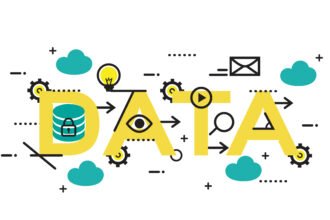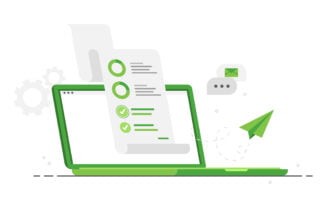Seizing the power of big data is essential in a world transitioning to green energy. Business data and analytics have the potential to drive organizations and society as a whole to new frontiers of efficiency. In many ways, they already have. Major corporations like Google and Intel have analyzed information supporting the benefits of adopting green energy. Now, they enjoy its advantages, using it to power electric and manufacturing operations worldwide. Impact on this scale wasn’t achieved on a whim or by determination, although they may have been a part of it. No, such a complete transition comes from a shift in perspective. This new mindset is a direct result of data and analytics. They help support the idea that green energy works and is something worth investing in. Business data allows companies to track and analyze trends and truly measure the advantages of adopting a green energy initiative. Sharing this valuable information with the world can change how people and corporations view green energy in several ways.
1. Digitizing Energy
One of the main principles of retail is that sales trend upward when consumers can hear, touch and even smell a product. They want something tangible, not an image or a statistic on a screen. Likewise, businesses want to know, feel and understand the product they will buy, from solar panels to wind turbines. Since it’s rather difficult for the renewable energy sector to present a tangible product to every potential customer, they must rely on data visualization to make the sale and create a cleaner planet. They do this by digitizing data, implementing the internet and using technology to capture, integrate, manage, analyze, store and share information. This allows companies to access and visualize information and statistics in a new, more tangible way. For instance, one report revealed the aggregated blue water footprint of 35 hydroelectric plants was equal to the global crop production’s footprint in 2000. This data point turns a statistic into a visual representation, making the information more relevant and tangible. Additionally, digitized data shortens the amount of time businesses need to evaluate information and make decisions. Thus, they can deliver insights in a few weeks instead of months or years.
2. Improving Energy Storage
Renewable energy sources like wind and solar don’t provide a constant stream of power, making them less reliable than fossil fuels. However, if businesses can capture and store green energy for future use, they may be able to forego fossil fuels entirely. Big data is helping solve this dilemma by improving how renewable energy is stored. With AI-driven, cloud-enabled software, businesses can gather information about how much energy clients need. This data then allows them to automate cost savings and predict both a client’s needs and the availability and cost of supply. Companies can then lower costs by storing electricity when it’s affordable and using it later when it’s more expensive. Predicting and coordinating this storage plan is extremely difficult, but AI makes the process possible by efficiently collecting and analyzing data.
3. Reducing Risk
Companies can also use data to reduce risk of power outages and the associated expenses. Traditionally, companies used this information to understand outage costs and determine if they should halt operations when the grid is under strain and energy prices suddenly rise. A planned power outage is less expensive than an unplanned one. For example, an unexpected grid outage can result in downtime, which can cost businesses more than $100,000 an hour. However, companies that use big data to predict these outages can prepare for a shutdown in advance. Moreover, this information may help businesses decide if a clean energy microgrid is a smart investment. As previously mentioned, storing energy for later use can lower operation costs. A microgrid would allow operations to continue in the case of an outage and help the company save money in the long run.
4. Increasing Profits
If microgrids produce more energy than they use, businesses can sell it back to the grid for profit. This valuable data saves money and offers an extra source of revenue. Additionally, it may help offset the initial cost of installing a green energy generation system. Using renewable energy can also directly impact a company’s performance and reputation, thereby increasing profits. For instance, one report found that dollar sales of items with specific sustainability claims outperformed the dollar growth of total products in their respective categories. One such thing was chocolate. In a single year, chocolate with environmental claims, including those made with renewable energy, grew by 22%. Data also showed that sustainable chocolate sales grew more than four times the rate of total category dollar growth in sales.
5. Attracting Employees
Just as customers seek to support sustainable brands with their dollars, more employees want to support green companies using their talent and effort. By investing in green energy, businesses are investing in their workforce and, thus, the future of their company. Nearly half the workforce and 62% of the millennial population want to work for an organization that positively impacts the planet. For some, this factor influences their decision even more than salary. Many businesses are using this data as a reason to support more sustainable, green-energy fueled operations. This distinguishes them from other employers and attracts a multitude of applicants who wish to work for a company that shares their values, efforts and beliefs. The applicants they do draw are likely willing to work harder and be more dedicated to their job than those who don’t value sustainability efforts. This dramatically increases a brand’s chances of hiring a top performer.
Gathering Evidence
While many companies are analyzing big data and choosing to adopt green energy, others believe that either there isn’t enough information to support it or it’s too confusing. Sustainability efforts are often difficult to measure because they affect society on a large scale. The specific implications, benefits and disadvantages are therefore hard to pinpoint and visualize. Further, the impact of these efforts is not always immediately obvious. As green energy has only become mainstream within the last few decades, there’s only so much evidence to support it. This information also comes in the form of different metrics and measurement systems. Businesses don’t know which one metric is better than the other and which would best fit their energy needs. Even leading brands need help deciding which ones will help them improve their efforts. While data to support green energy does exist, there’s still much to be understood about it. In the future, the green energy sector can gather more supporting evidence and information by continuing to monitor sustainability efforts. They may also seek to create more digitized data, making it more accessible, tangible and understandable to companies that wish to join this green revolution.










